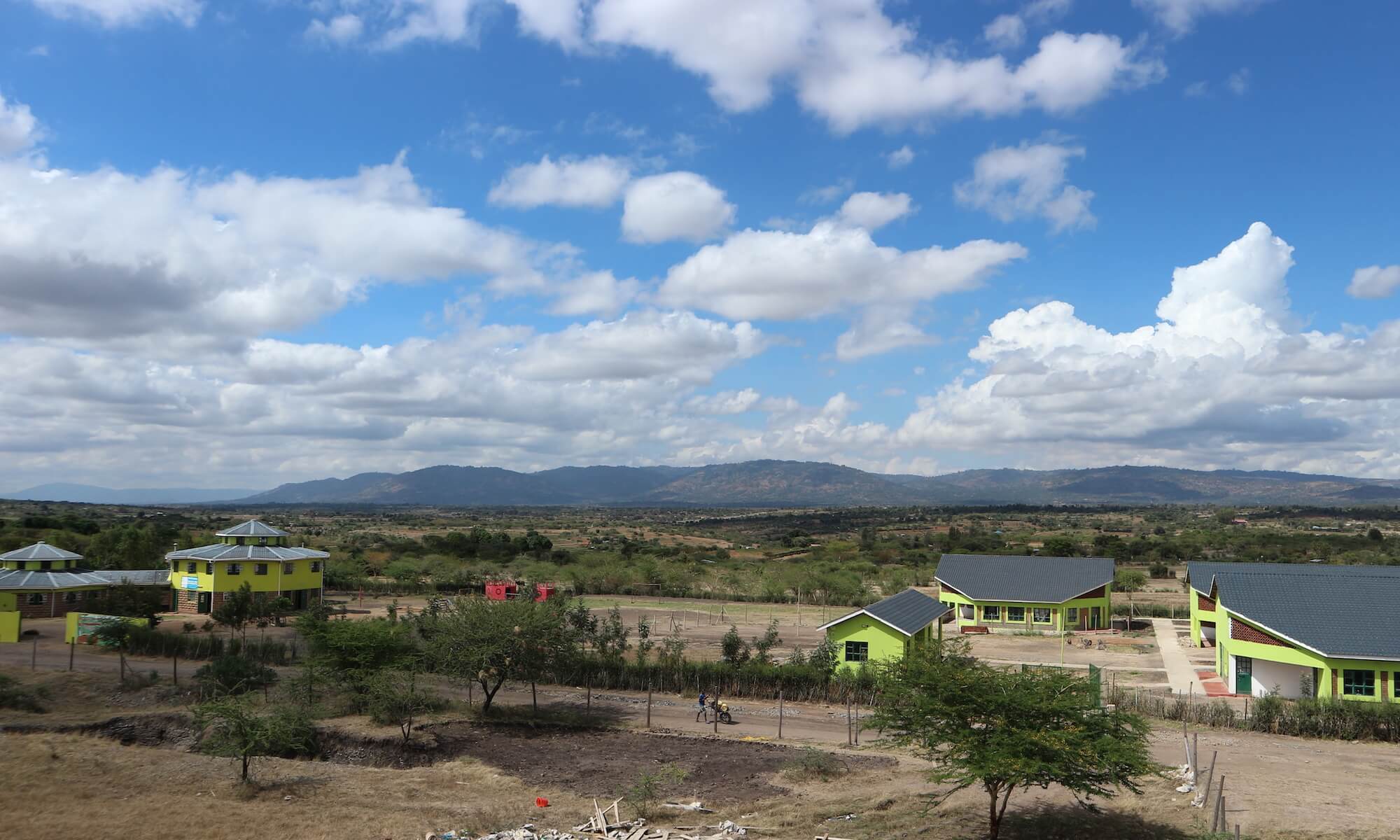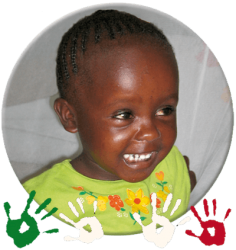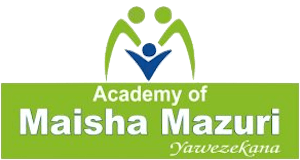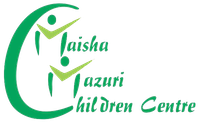- What are the needs of the children that will be covered by your/our money?
- Which children will be supported by the Sponsorship Programme?
- Where do the children come from and how are they „selected“?
- How old are the children?
- How do I become a Sponsor?
- What are the costs of a Sponsorship? And how is the money used?
- How do I know that my money will reach my Sponsored Child (SC)?
- Monthly or single donation for all Maisha Mazuri Partner Children without direct contact to the child
- Ending my Sponsorship?
- How does the Kenyan school system work?
- Who manages the programme in Kenya?
- Do you have any further questions?
What are the needs of the children that will be covered by your/our money?
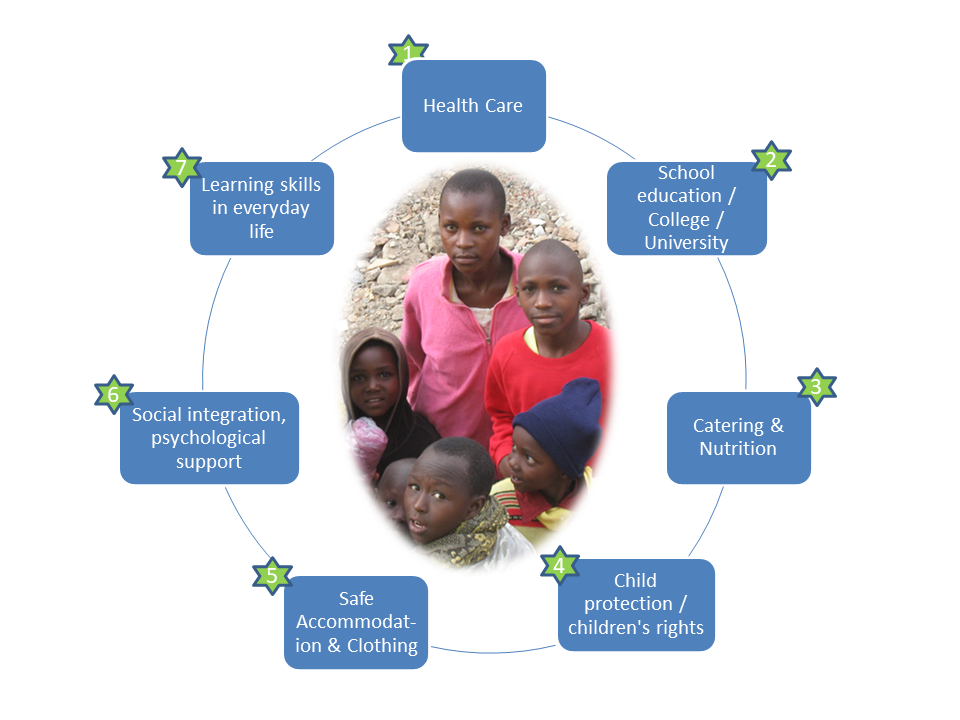
Which children will be supported by the Sponsorship Programme? Where do the children come from and how are they „selected“?
Most of the children in the Maisha Mazuri Children Centre (MCC) come from the close vicinity of the MCC as well as from the slums of Nairobi. Jimmy Kilonzi and his team from Youth Support Kenya have been working for many years in the slums of Nairobi and in the vicinity of the MCC, i. e. in Machakos County.They have built a very good network, they work together with the representatives of the communities, the youth welfare office and the local women’s groups and therefore know very well which children need support.
Repeated visits to the home and extensive interviews with the remaining relatives of the children lead to a comprehensive report that provides information about the complete name and the age of the child, about the natural parents, the siblings and other relatives, state of schooling, religion, diseases and other important facts in the life of the child.
Following this it will be decided whether the child will be admitted to the Sponsorship Programme. Additionally it will be considered whether the child should be taken from his present surroundings and brought to the MCC – or whether the child is best cared for remaining with his or her own family.
How old are the children?
The children nowadays usually are between 4 and 22 years old and therefore already in or still go to primary school. Your support does not end with the primary school, as this level of education is not a sufficient background to learn a trade. The sponsors support their Kenyan SC still and especially in high school, as this educational stage could not be financed without your/our support. A solid and later on advanced education and the chance to feed themselves and a family later in life can only be reached via high school.
So all these years at school are the prerequisite for a successful way out of poverty, HIV, youth-pregnancy, crime etc. For all these years our children need a reliable sponsor who secures the seven needs of each of these children. (–> additional information: How does the Kenyan school system work?)
How do I become a sponsor?
Everybody can become a sponsor of one of our children!
Sponsors can be individual persons, families, companies, organisations or schools/school classes. Please consult our contact person Helen Milkau (MMP@4kenya.info), who can give you all the necessary information about your SC, for instance a picture, a history of the family or similar things. You can decide about the age and the gender of your SC. Some children need very special support due to a disease or a handicap or are soon going to high school; that only can be financed via a Sponsorship. Helen does know many of our children personally and will happily help you with information and advice.
What are the costs of a Sponsorship? And how is the money used?
A minimum monthly donation of € 30,00 will support your SC. This amount will mainly be used to meet the afore mentioned seven needs of your SC.
When your Sponsored Child needs less money during a particular month but a playmate in the MMP has a higher requirement because of payments for a hospital, medicine or some school fees, the costs can be balanced. Perhaps one month or one year later it is the other way round.
The money goes to an account that is only used to cover the needs of the children. It can be seen as a pool for all – at present – 108 children in the MMP. It serves all the seven needs shown in the diagram above equally in due course for all our children.
Therefore you can be sure that YOUR Sponsored Child is always cared for and your monthly donation will be completely (100 %) used for the children!
This kind of distribution and disposition of donations is very important to ensure equal treatment of all children. We hope you will understand our way of handling this question.
At the very beginning of a new calendar year you will get a receipt for your donation of the previous year. You can use this when filling your tax return. Up to € 300,00 listed on the transfer form is sufficient for the tax office.
How do you communicate with your Sponsored Child?
You will receive at least two personal letter from the child every year (mostly in December and June). Then you should be happy to intensify your correspondence as you can write letters in the meantime that will be forwarded by us whenever somebody goes to Kenya. The children very often are not (yet) able to write their own letters, also because written communication is not very common in their surroundings. If this is the case our Social Workers will write those. But the children and their families are curious and want to know everything about you and they are proud to get letters from abroad. So tell them about your home, family, your garden, friends, hobbies, favorite food and special things happening in your neighbourhood. Send them pictures, even cuttings from a newspaper and give them an idea how they can tell you about their life – in writing their own letters or through the help of our volunteers or social workers. The letters between you and the child are an essential part of the program.
! What we do not recommend is to send a parcel to your Sponsored Child. The parcels do arrive at the postal main station in Nairobi and will be opened. Nobody can guarantee that all the content is still in the parcel when it will be picked up by the recipient. In addition, customs will estimate the value of the content and determine the tax to be paid for the parcel. This tax very often is so much that the recipients are not able to pay. If there is need for any special gift for a child or their family, please contact Helen Milkau. There are large shopping malls in Nairobi where you can buy nearly everything that is necessary for life; our contact persons on site can buy these things for us and you!
How do I know that my money will reach my SC?
- Annual reports from Youth Support Kenya and our organisation Hand in Hand für Kenia supply information about the use of the money.
- You communicate with your partner child by exchanging personal letters, which you will receive twice a year (usually in December and June). So you get feedback and you always know whether your money/your extras have reached the child.
- You are also welcome to visit the MCC.
Monthly or one-time donation to all Maisha Mazuri Children without direct contract to a specific child
If you would rather provide a monthly donation that benefits all children in the Maisha Mazuri Programm but do not wish to enter into a direct partnership incl. writing letters, then this is of course also a possibility. Your donation will also be paid directly into the “MMP account” but it can then be used for all children. Just simply let us know if this would be your preference. Note: for transfers please add the following in the subject line: MMP-ALL CHILDREN
Ending my Sponsorship?
You can end your sponsorship for MMP at any time without giving a reason. You only have to send a brief e-mail to our institution (mmp@4kenya.info, Helen Milkau) so that we are able to look for a replacement sponsor for the child as soon as possible.
Children can leave the MMP as well. There are different reasons, for instance: The Sponsored Child ends the MCC plan as scheduled and can care for him-/herself or the parents / responsible relatives take back their approval for the project, they move to a distant location or the child dies.
How does the Kenyan school system work?
- At the age of 3 the children start to visit the kindergarten, a kind of preschool. This is necessary to go to school later on. Usually the kindergarten is located in the building of the primary school. The kindergarten has 3 grades: Baby-Class (3 years), Middle-Class (4 years) and Final-Class (5years).
- In 1985 the 8-4-4 school-system was introduced in Kenya; it is very similar to the British system. 8-4-4 means: 8 years of primary school, 4 years of secondary school/high school and 4 years of university or college. College does not completely reach the educational level of the university. (This system will be changed to 6-6-4 from 2021 onwards)
- Each school year is divided into 3 „terms“ and starts in January. Each „term“ ends with an examination.
- School fees for the primary schools were abolished in 2003. Yet that does not mean that school is completely free for the children. Parents have to pay for the school uniforms – they are already compulsory in the kindergarten – , the school-material ( books, exercise books, pens etc.). An additional problem is the poor qualification of the teachers at many schools in the country. Parents who look for a better graduation degree for their children must send them to a boarding school, mostly in a distant location and with additional costs for room and board.
- At the end of class 8 the children have to pass a standardised examination in Kenya, the Kenyan Certificate of primary Education (KCPE). A „good“ certificate is the condition for admission to a secondary school/high school.
- The secondary schools are tuition-based comprehensive schools. There are private as well as public schools. Because of the high school fees most Kenyan families cannot afford these schools, even if some children are financially supported by scholarships or sponsoring programmes. High school ends after class 12 with another standardised examination, the Kenyan Certificate of secondary Education (KCSE). The Academy of Maisha Mazuri, a high school on the grounds of the MCC, opened its doors in January 2019, which offers a dual track of higher education coupled with vocational training. This now affords our children the opportunity to earn their high school degree.
- Only a „good” degree from the secondary school allows admission to a university. Tuition fees vary from university to university. For College or Special Education a degree of a primary or secondary school is necessary.
Do you have any further questions?
If you have additional questions please send an e-mail to mmp@4kenya.info. Helen Milkau will be happy to answer all questions about Maisha Mazuri Partnership.
